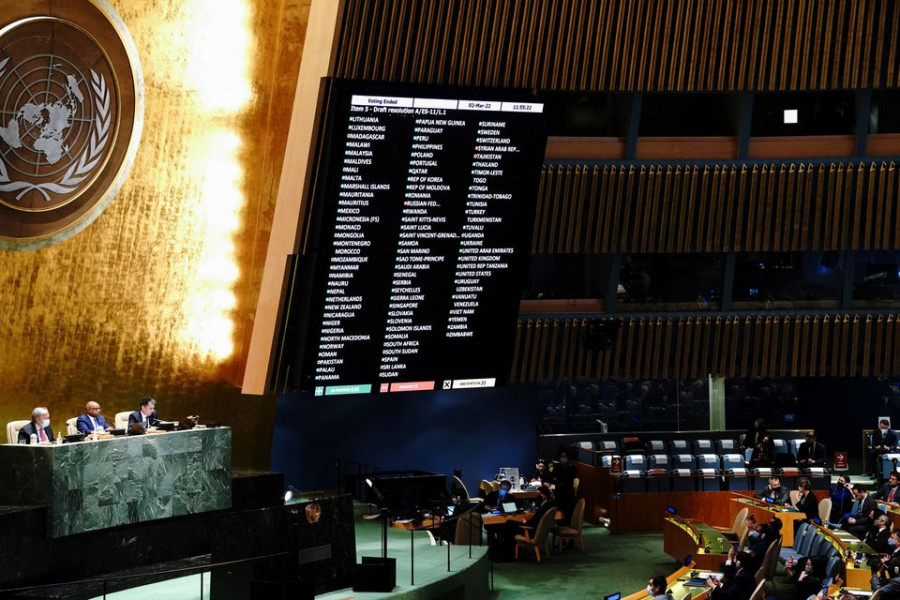
A general view shows the results of the voting during the 11th emergency special session of the 193-member UN General Assembly on Russia’s invasion of Ukraine, at the United Nations Headquarters in Manhattan, New York City, US, March 2, 2022. REUTERS
On Wednesday, the United Nations General Assembly passed a resolution demanding Russia “immediately, completely and unconditionally withdraw all of its military forces from the territory of Ukraine within its internationally recognised borders”.
Nepal was among 141 member states—out of 193—to vote in favour of the UN resolution. Nepal’s two giant neighbours, India and China, abstained. Five—Belarus, North Korea, Eritrea and Syria and Russia naturally—voted against.
South Asian nations were evenly divided. Besides Nepal, Bhutan, the Maldives and Afghanistan voted in favour of Ukraine. Afghanistan’s vote, however, remains asterisked because at the UN, its representatives are from the days before the Taliban takeover of the country. Besides India, Pakistan, Sri Lanka and Bangladesh abstained.
Experts and foreign policy watchers say Nepal this time has actually amended a mistake it made in 2014 when it decided to abstain from the UN vote on Crimea annexation by Russia. According to them, the division in votes among South Asian nations this time on Ukraine indicates a geopolitical shift in the region.
“Wednesday's UN vote on Ukraine does demonstrate a geopolitical change in South Asia, and as far as Nepal is concerned, it corrected its past mistake of 2014,” said Ramesh Nath Pandey, a former foreign minister.
Despite vigorous lobbying by Western countries, Nepal decided to skip the 2014 UN vote, saying that it will look into its national interest first before making a decision. Nepal's two giant neighbours India and China—whose vote and position count in the UN General Assembly—are in different boats on the issue.
Nepal’s voting on Wednesday night is in line with its position it made on February 24, the day Russian President Vladimir Putin ordered what he called a special military operation in Ukraine after massing his troops on the borders of the eastern European country for weeks.
Kathmandu’s statement was starkly different from that of either Delhi or Beijing, which stopped short of opposing the Russian attack.
In his statement in New York on Tuesday, Amrit Rai, Nepal’s Permanent Representative to the United Nations, said Nepal opposes any threat or use of force against the territorial integrity and political independence of any sovereign country.
“Return to the path of peace is never late,” said Rai.
According to Constantino Xavier, research fellow at the Centre for Social and Economic Progress, a New Delhi-based think tank, Afghanistan, Nepal, Bhutan and the Maldives who voted in favour of Ukraine are four small and most vulnerable states in the region and most concerned about losing foreign policy autonomy due to great power competition.
“States that are at the crossroads of clashing spheres of influence are exposed to external interference,” said Xavier in an interview with the Post. “India is not a small state, so this concern/exposure does not apply to it as a middle/great power.”
Delhi has struggled to tread carefully given its decades-old ties with Moscow. Russia continues to be India’s largest arms supplier. But for Delhi, the United States is equally important, especially to contain China.
“Sri Lanka and Bangladesh, in my view, are worried but less than the four other nations [Nepal, Bhutan, Maldives and Afghanistan],” said Xavier. “Bangladesh has done very well in balancing and making the most of great power competition, allowing it to increase its foreign policy autonomy. But again, there are many other factors to play, case by case. And, at UNGA, everyone finds ideological inspiration.”
Nepal in the past more often than not has followed India’s line on some crucial votes at the UN, with Myanmar being the latest example when the world body sought a resolution against junta atrocities on Rohingya in June, 2021. India abstained. So did Nepal, eliciting criticism as it is a member of the UN Human Rights Council.
In its February 24 statement immediately after the Russian invasion of Ukraine, the Ministry of Foreign Affairs said that Nepal opposes any use of force against a sovereign country in any circumstance and believes in peaceful resolution of disputes through diplomacy and dialogue.
“Nepal views that the principles of sovereignty and territorial integrity as enshrined in the UN charter are sacrosanct and must be fully respected by all member states,” the ministry said.
According to Xavier, Nepal has rediscovered its non-aligned, small state foreign policy, which was best articulated in the early 1980s with the Nepal Zone of Peace proposal.
According to some news outlets, Sri Lanka, which is facing a severe economic crisis, has chosen to skip the vote due to economic reasons.
Lankan Foreign Secretary Jayanath Colombage said that the economic impact on Sri Lanka would be “severe” from the conflict.
“We will have to pay more for our fuel and gas, our tea market will get affected,” Colombage said, according to one media report.
Ahead of the UN voting, US Secretary of State Anthony Blinken on Tuesday night called Prime Minister Sher Bahadur Deuba and discussed the Ukraine crisis among other things.
“Good call today with Nepal’s Prime Minister @SherBDeuba to discuss Russia’s unprovoked attack and our support for Ukraine's sovereignty and territorial integrity,” Blinken tweeted after his telephone call with Deuba.
“Spoke with US Secretary of State @SecBlinken and discussed Nepal's poverty alleviation, development and issue of climate change,” Deuba tweeted after his conversation with Blinken.
Foreign policy watchers say Nepal’s voting at the UN to deplore the Russian invasion is in line with its foreign policy and that it would be wrong to interpret it as an outcome of the telephone conversation between Deuba and Blinken. After all, Nepal and the US share deep ties, with the two countries celebrating their 75 years of diplomatic relations this year.
“The voting pattern of the South Asian nations on the UN resolution does show the shift in the geopolitical landscape in the region,” said Pandey, the former foreign minister. “Our position, however, is in accordance with our foreign policy. We have to maintain this fundamental principle of our foreign policy.”
Nepal on Monday voted in favour of Kyiv’s call at the UN Human Rights Council for an urgent debate on the Ukraine situation. India and China abstained.
According to experts, there are multiple factors member states take into consideration while voting on UN resolutions.
Such UN resolutions are not binding but have political weight to pile pressure on Russia to withdraw its troops from Ukraine.
Arjun Bahadur Thapa, former secretary general of the South Asian Association for Regional Cooperation, a grouping of eight countries in the region, said that different factors and individual interests are at play during voting in platforms like the UN.
“For India, they have a long history of cooperation in different fields with the Russians. China shares a similar kind of sentiment with Russia. Nations like Nepal, Bhutan, the Maldives and Afghanistan voted for Ukraine because they stood by the principle of non-interference as they are smaller countries,” said Thapa. “And we must remember that we do not follow the voting pattern of India and China at multilateral platforms like the UN.”













